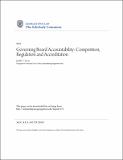|
Reseña:
|
This article examines the three primary ways in which the governing boards of American colleges and universities are held to account: (1) competition; (2) regulation, including state nonprofit corporation laws, tax laws, and licensing laws; and (3) accreditation. It begins by tracing how lay (meaning nonfaculty) governing boards became the dominant form of governance in American higher education. It argues that governing boards provide American institutions of higher education with an exceptional degree of autonomy from state control and that, together with the shared governance approach that gives faculties primary responsibility for academic matters, they have been a vital factor in producing the leading system of higher education in the world. The article concludes with recommendations for improving board oversight including avoiding the reputational harm caused by excessive compensation or conflicts of interest, recognizing that the public expects the nondistribution constraint to be extended to such academic goods as admissions and graduation requirements, and understanding the risk posed by increased government control of accrediting bodies.
Reseña: This article examines the three primary ways in which the governing boards of American colleges and universities are held to account: (1) competition; (2) regulation, including state nonprofit corporation laws, tax laws, and licensing laws; and (3) accreditation. It begins by tracing how lay (meaning nonfaculty) governing boards became the dominant form of governance in American higher education. It argues that governing boards provide American institutions of higher education with an exceptional degree of autonomy from state control and that, together with the shared governance approach that gives faculties primary responsibility for academic matters, they have been a vital factor in producing the leading system of higher education in the world. The article concludes with recommendations for improving board oversight including avoiding the reputational harm caused by excessive compensation or conflicts of interest, recognizing that the public expects the nondistribution constraint to be extended to such academic goods as admissions and graduation requirements, and understanding the risk posed by increased government control of accrediting bodies.
|

